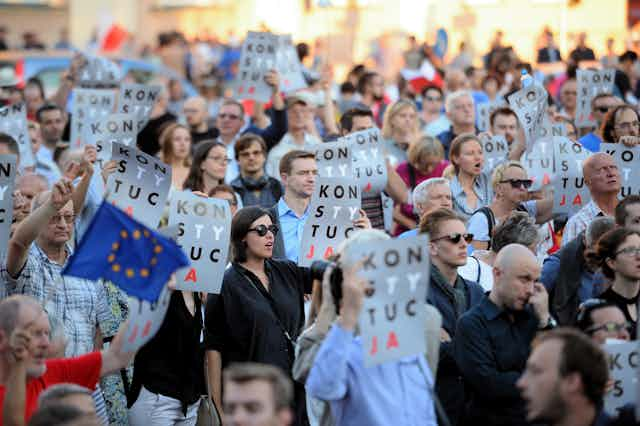It was always going to be a hard task to rebuild judicial independence in Poland. Throughout some 40 years of communist rule, an independent justice system was incompatible with the way the state was governed. For example, rulings by the judges in the High Court could be overturned by the state. The position of the judiciary was not a stable one, and the third branch of power was certainly not recognised as such.
Now, the Polish government has again destabilised the judiciary, introducing a new law that has forced 27 of Poland’s 72 Supreme Court judges into retirement by lowering the retirement age from 70 to 65. This includes the president of the Supreme Court, Małgorzata Gersdorf, who has defied the law by continuing to come to work. She addressed the crowds protesting against the new law, saying: “I hope that legal order will return to Poland.” In her view, all the years of commitment to building democracy have been swept away, unconstitutionally, and this is causing irreparable damage.
Gersdorf is right to be concerned, and it seems a good portion of Poles are worried too, as crowds have taken to the streets to protest the new law. The governing Law and Justice party (Prawo i Sprawiedliwość, or PiS) has also mandated the creation of a judicial disciplinary chamber, on the grounds that the judiciary is corrupt and operates on nepotism.
Rebuilding democracy
Do the claims of PiS have any merit? It’s important to resist generalisations. It would be a mistake to dismiss all communist judges as servile puppets, unable to apply the law in a just fashion, according to due process. Under communism, many Polish judges, like Gersdorf, were members of the opposition movement, Solidarność, and resisted the draconian laws that were introduced to stifle political opponents under martial law (lasting 1981 to 1983) as best they could.

Polish judges continued with their careers after the fall of communism in 1989, and many went on to re-establish the rule of law as part of the bench on the Supreme Court and the Constitutional Tribunal. Former tribunal judges, such as Ewa Łetowska (who was also the country’s first human rights commissioner) and Andrzej Rzepliński have played an integral role in rebuilding a democratic Poland – one that adheres to the rule of law.
Both judges contributed to landmark decisions during their judicial tenures. Both were part of the 1989 enthusiasm about a democratic Poland. In fact, at the 1989 Polish roundtable talks – where negotiations between the outgoing communist government and opposition leaders occurred – Polish lawyers were the ones to bring a motion for ensuring judicial independence was guaranteed.
A return to the past
This new law is the third in a series of reforms set in motion by PiS, which are effectively dismantling judicial independence in Poland. For example, the National Council of the Judiciary, which nominates judges, has already been reformed to accommodate PiS, ensuring that further judicial reforms will not be blocked. The president of the National Council of the Judiciary, Dariusz Zawistowski, resigned in protest.
Since 1989, various political parties alleged corruption on the part of the communist-trained and communist-educated judiciary. They referred to “telephone justice” – a form of corruption that characterised communist rule. Telephone justice operated through a few key members of the judiciary, who were politically subservient to the communist party, and complied with orders given by party officials on how to decide politically sensitive cases.
In 1997, an important reform was passed to address these concerns; it also set out the conditions for judges’ retirement. It represented a return to pre-World War II legislation, in an effort to bolster judicial prestige and introduce stability into the judiciary. The 1997 law introduced established several offences, which judicial officials could have committed – such as collaboration with the secret police – which could lead to forced retirement or a review of pensions. The National Council of the Judiciary conducted a review and identified judges who met the criteria.

In 1998, a further amendment introduced disciplinary measures against judges who rendered unjust rulings. Some 30 cases concerning 48 judges were heard before a disciplinary court. The reports from the disciplinary proceedings show the careful scrutiny that was afforded to each case. Adam Strzembosz, former president of the Supreme Court, fought hard to support such a policy. He also held that the mistakes of a few cannot justify writing off the judiciary as corrupt, or falling sway to the powerful feelings of outrage, which understandably emerge when confronted with the miscarriage of justice. How prescient his words were.
As I have argued elsewhere, for Poland, a re-evaluation of the past could involve a personal or official judicial verification process, that can result in criminal prosecution. This would, in a sense, free the profession from the taint of the past. But equally, it presents opportunities for certain members of the government to control and subordinate the judiciary.
As it stands, Poland is divided over the future of its judges, and their role in creating a just society. Yet the latest developments display a return to old habits; namely manipulating judges and hindering any progress towards a viable third branch of power. The PiS will next turn its attention to the human rights commissioner, Adam Bodnar, who has already had his budget cut and lost his judicial immunity, leaving him vulnerable to dismissal.
Losing the country’s constitutional authority for the protection of civil liberties and human rights will come at a high costs to every individual’s liberties and rights. It can only be hoped the Polish people will continue to fight for their rights, and look to the European Union as it takes ever more drastic measures to curb the state’s breaches of what is at the heart of European values - the rule of law.

